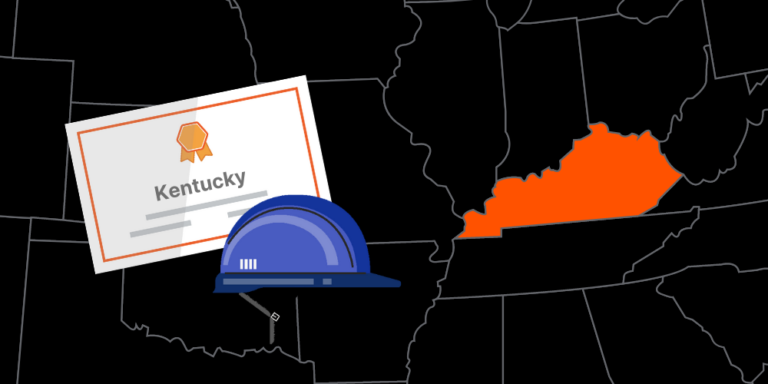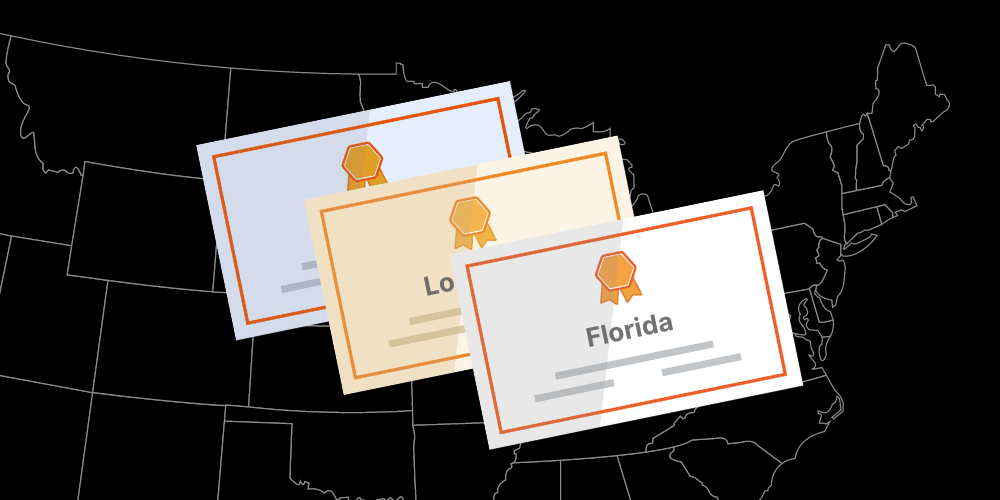— 6 min read
Kentucky Contractor Licensing Guide
Last Updated Jan 30, 2025
Last Updated Jan 30, 2025

The state of Kentucky requires contractors in electrical, plumbing, and HVAC to secure a state contractor license, while most other contractors are regulated by municipality.
We've put together a comprehensive guide showing you how to get the license you need so that you can focus on growing your business. Keep reading for all the information you'll need about the Kentucky contractor licensing process.
Table of contents
How to get a contractor license in Kentucky
The only contractors that the State of Kentucky requires to carry a state-issued license are electrical contractors, plumbing contractors, and HVAC contractors. Other than that, all licensing will go through local municipalities and counties.
With that said, all businesses that operate within Kentucky are required to register their business with the state.
Business registration
All businesses operating in the State of Kentucky need to register with the Kentucky Department of Revenue, including contractors. The steps include:
- Establish your business: Sole proprietors and general partnerships need to register with the County Clerk in which the business resides. Other businesses must register with the Kentucky Secretary of State.
- Obtain a Federal Employer Identification Number (if you have employees).
- Register for Tax Accounts and Commonwealth Business Identifier.
- Register with the State, County, and local governments (which you will more than likely accomplish when applying for licensing).
Most municipalities will require you to register with the state before applying for licensing, so this is the first step to getting a contractor license in Kentucky.
Electrical contractor licenses
Applicants looking to start an electrical contracting business need to obtain a license through the Department of Housing, Buildings, and Construction. The requirements include:
- Filling out the EL-2 Electrical Contractor License Application on this page
- Obtain a liability insurance policy valued at $500,000
- Proof of worker’s compensation insurance
- $200 application fee payable to the Kentucky State Treasurer
- Passport photo
- Pass the exam
In order to actually operate as a contractor, each electrical contractor must also employ a master electrician. The requirements for master electricians include:
- Filling out the EL-3 Electrician License Application on this page
- Six years of experience as an electrician
- $100 application fee payable to the Kentucky State Treasurer
- Passport photo
- Pass the trade exam
Stay updated on what’s happening in construction.
Subscribe to Blueprint, Procore’s free construction newsletter, to get content from industry experts delivered straight to your inbox.

Plumbing contractor licenses
Contractors starting plumbing businesses in Kentucky must also go through the Department of Housing, Buildings, and Construction, just like electrical contractors. However, there is a significant difference in the requirements.
Unlike electrical contractors, plumbers don’t have to carry a contractor license, specifically. However, they do have to employ a master plumber and work under that person’s trade license. The requirements for getting a master plumber license are:
- Fill out the PLB-1 Master Plumber License Application on this page
- Pay a $250 license fee payable to the Kentucky State Treasurer
- Attach a passport photo
- Carry general liability insurance
- Carry worker’s compensation insurance
- Pass the trade exam
HVAC contractor licenses
HVAC contractors will also have to go through the Department of Housing, Buildings, and Construction for their licenses. Unlike both electrical and plumbing licensing requirements, the master HVAC license and contractor license are one and the same. The requirements include:
- Complete the HVAC 1 - Master Contractor License Application on this page
- Pass an exam including business and law
- Attach a passport photo
- Prove two years of mechanical experience
- Proof of general aggregate insurance of $800,000
- Pay the application fee, which ranges from $145.83 to $375, depending on when you apply, payable to the Kentucky State Treasurer
Contractor licensing requirements by municipality
Many licensing requirements in Kentucky fall under the control of individual municipalities or counties throughout the state. Each can have its own requirements, so don’t assume holding a license in one city allows you to work in the neighboring city. Be sure to check with the local building department where you're planning to work.
Louisville
Contractors working in Louisville, Kentucky, will need to obtain a license through the Louisville Metro Department of Codes and Regulations. There are several license types available.
First, contractors must choose a license type: License Type A or License Type B. Building Type A is for Contractors that will obtain multiple permits throughout the year, which includes contractors working on single or multi-family residences, and they’re required to complete six hours of continuing education each year. Building Type B is for building contractors who wish to obtain only one building permit per year.
After choosing A or B, there are then 5 different subtypes to choose from:
- Building A-R (Residential)
- Building A-RC (Residential and Commercial)
- Building A-C (Commercial)
- Building B – Residential
- Building B – Commercial
The requirements for receiving a contractors license in Louisville are:
- Obtain an Occupational License Number from the Louisville-Jefferson County Revenue Commission
- Submit proof of worker’s compensation insurance or an affidavit stating you don’t have employees
- Carry liability insurance of $250,000
- The application, which can be found on the louisville.gov Contractor Licensing portal.
The fees vary depending on the application type, but Type A contractors will pay $125 while Type B contractors will pay $50. Most other licenses are $75, but refer to page 2 of the application packet for clarification as fees are subject to change.
Courses about construction.
For construction.
Unlock your career potential with our free educational courses on Health & Safety, Data in Construction, and more.
Lexington-Fayette
Contractors working in the Lexington-Fayette area will register their businesses instead of applying for a license. The steps are fairly straightforward. They include:
- Completing a Certificate of Occupancy application and Occupational business license, both of which can be found at lexingtonky.gov/permits.
- Applying for a business license through the city’s Revenue department:
Revenue
200 E. Main St., 2nd floor
Lexington, KY 40507
You'll also need to provide proof of liability and worker’s compensation insurance:
- $500,000 for each occurrence for General Contractors
- $250,000 for each occurrence for General Contractors, Residential Only
- $100,000 for each occurrence for Specialty Contractors
For the most up-to-date information, consult Lexington's How to Register as a Contractor page.
Bowling Green
Bowling Green, Kentucky, requires general contractors and specialty contractors to obtain licenses. Licensing falls under the control of the Contractors Licensing Board. License types include:
- Carpentry
- Drywall
- Electrical
- Fencing
- Framing
- Glass and Glazing
- Handyman
- Landscaping
- Masonry
- Plumbing
- Roofing
- Siding, and many more
Would-be contractors will fill out this application, and include the following information:
- The names, addresses, and social security numbers of all owners or officers
- Applicable state license
- Choose license type
- Provide a certificate of insurance showing a minimum of $100,000 general liability
- Proof of worker’s compensation insurance
- Submit payment:
You will also need to obtain a Bowling Green Occupational License through the Finance Department, as well.
Penalties for unlicensed contracting in Kentucky
While Kentucky certainly doesn’t condone unlicensed contracting, it leaves most of the penalties up to local municipalities. This means that many local jurisdictions have their own form of punishment for contracting without a license, and they usually include steep fines and a possibility of jail time.
For example, contractors in Lexington-Fayette who do not obey local licensing and registration laws are subject to fines between $50 and $500 per instance, and each day is a new instance.
Was this article helpful?
Thank you for your submission.
86%
14%
You voted that this article was . Was this a mistake? If so, change your vote here.
Scroll less, learn more about construction.
Subscribe to The Blueprint, Procore’s construction newsletter, to get content from industry experts delivered straight to your inbox.
By clicking this button, you agree to our Privacy Notice and Terms of Service.
Categories:
Tags:
Written by
Tom Scalisi
57 articles
Tom Scalisi is a writer with over 15 years of experience in the trades. He is passionate about educating contractors and specialty contractors about the best practices in the industry. He has seen first-hand how education, communication, and preparation help construction professionals overcome challenges to build a strong career and thriving business in the industry.
View profileExplore more helpful resources

Contractor License Bonds: Everything You Need to Know
In order to perform construction work, many states require contractors to be “licensed and bonded.” What does that mean? Well, every state sets its own rules for contractor licensing, and...

Contractor’s Guide to License Reciprocity: Working Across State Lines
For many contractors, growing a construction business means taking on jobs in different states. Whether it’s to take a one-off project or to establish a new business location, working in...

Vermont Contractor License: Guide to Rules & Requirements
If you’re starting a construction business in Vermont or looking to expand your business from another state, being properly licensed to work is one of the first key steps. There...

The Maine Contractor License: Guide to Rules & Requirements
If you’re considering starting a contracting business in Maine, it’s important to know the rules and requirements for proper licensing. Maine takes a different approach to contractor licensing than most...